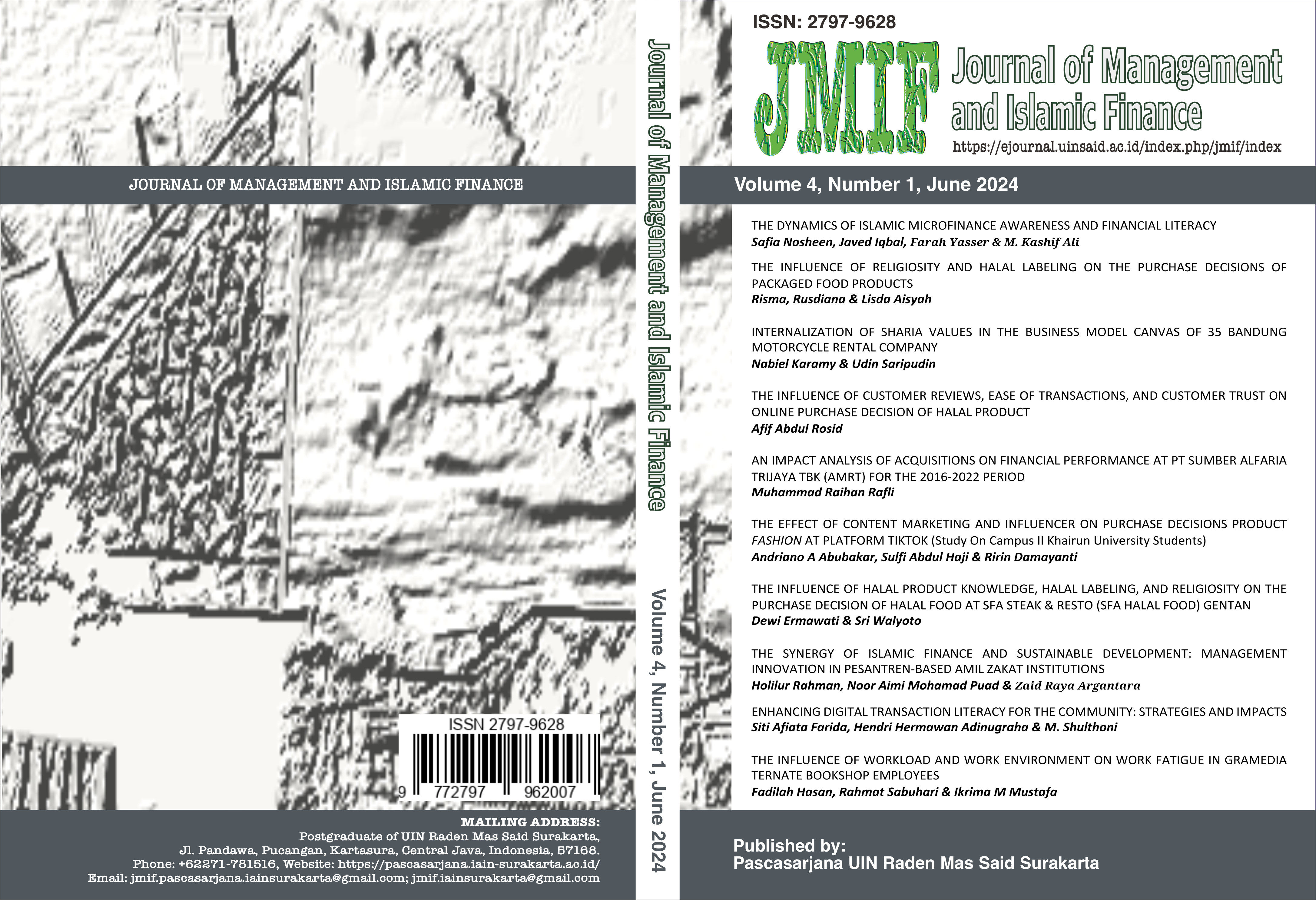ENHANCING DIGITAL TRANSACTION LITERACY FOR THE COMMUNITY: STRATEGIES AND IMPACTS
DOI:
https://doi.org/10.22515/jmif.v4i1.8946Keywords:
Digital literacy, Digital transactions, Improvement, Socialization of digital transaction literacyAbstract
Downloads
References
Alim, M. N., Supriadi, Marasabessy, R. H., & Solihin, R. (2022). Literasi Peran Fintech dan Bisnis Digital Syariah Untuk Penguatan Ekonomi Umat. I-Com: Indonesian Community Journal, 2(2), 79–88. https://doi.org/10.33379/icom.v2i2.1296
Andreanto, M. U., Sabila, J. M., Fawaz, A., & Hermawan, H. (2023). Dissemination Of Digital-Based Literacy To The Community Islamic Sosialisasi Literasi Keuangan Syariah Berbasis Digital Terhadap Masyarakat. Jurnal Pengabdian Masyarakat, 2, 37–43.
Anggraini, O., & Supriyanto, S. (2019). Literasi Digital: Suatu Kemewahan bagi UMKM Perikanan di Era Industri 4.0? 117–126. https://doi.org/10.33510/slki.2019.117-126
cahyaningrum. (2021). Perkembangan UMKM Perbidang Usaha di Kota Semarang Jenis Pelanggan Teknologi Financial di Indonesia Tahun 2019. 0–11.
Carme, M., & Pemmer, T. (2019). Information Literacy Education : A process approach.
Chishti, S. (2016). The FinTech Book The Financial Technology Handbook For Investors, Entrepreneur, and Visionaries.
Falloon, G. (2020). From digital literacy to digital competence : the teacher digital competency ( TDC ) framework. Educational Technology Research and Development, 68(5), 2449–2472. https://doi.org/10.1007/s11423-020-09767-4
Hasan, M., Le, T., & Hoque, A. (2021). How does financial literacy impact on inclusive finance ? Financial Innovation. https://doi.org/10.1186/s40854-021-00259-9
Jungo, J., Madaleno, M., & Botelho, A. (2023). Financial Literacy , Financial Innovation , and Financial Inclusion as Mitigating Factors of the Adverse Effect of Corruption on Banking Stability Indicators. In Journal of the Knowledge Economy (Issue 0123456789). Springer US. https://doi.org/10.1007/s13132-023-01442-2
Nduru, M. P., & Genua, V. (2022). Pendampingan Kegiatan Literasi Digital KKN Tema Kabupaten Ende. Mitra Mahajana: Jurnal Pengabdian Masyarakat, 3(19), 202–208.
Pranata, S. P. (2024). Digital Literacy, Skills, and Security: Impact on Digital Leadership in Higher Education. Al-Tanzim: Jurnal Manajemen Pendidikan Islam, 8(3), 775–791.
Prasanti, D., & Indriani, S. S. (2017). Pelatihan Literasi Media Digital bagi Murid-Murid Armidale English College ( AEC ) di Soreang Kabupaten Bandung Selatan Digital Media Literacy Training for Students Armidale English College ( AEC ) in Soreang , District of South Bandung. Jurnal Pendidikan Dan Pemberdayaan Masyarakat, 4(2), 157–165.
Rivoltella, P. C. (2008). Digital Literacy : Tools and Methodologies for Information Society.
Rudeloff, M. (2019). The influence of informal learning opportunities on adolescents ’ financial literacy. Empirical Research in Vocational Education and Training. https://doi.org/10.1186/s40461-019-0086-y
Safira, R., Sugianto, S., & Harahap, R. D. (2023). Pengaruh Kepercayaan, Kemudahan, dan Manfaat Digital Payment Sebagai Alat Pembayaran Terhadap Perilaku Konsumtif Individu Dengan Digital Savvy Sebagai Variabel Moderating. Al-Kharaj : Jurnal Ekonomi, Keuangan & Bisnis Syariah, 5(6), 2859–2878. https://doi.org/10.47467/alkharaj.v5i6.3694
Sanjaya, P. K. A., Hartati, N. P. S., & Premayani, N. W. W. (2020). “Pemberdayaan Pengelola Badan Usaha Milik Desa ( BUMDes ) Berdikari Melalui Implementasi Digital Marketing System.” Carrade : Jurnal Pengabdian Kepada Masyarakat, 3(1), 65–75.
Siswanti, T. (2023). Pengaruh Literasi Keuangan Digital Dan Sosial Ekonomi Terhadap Pemanfaatan Digital Payment Dengan Budaya Sebagai Variabel Moderating. Jurnal Bisnis & Akuntansi Unsurya, 8(1), 30–43. https://doi.org/10.35968/jbau.v8i1.1017
Stagg, S., & Friedrich, N. (2022). The Role of Place and Play In Young Children’s Language and Literacy. University of Toronto Press.
Suarantalla, R., Aliyah, J., & Tryana, A. L. (2023). Melangkah ke Era Digital: Sosialisasi Literasi Keuangan untuk Transaksi Non Tunai. Parta: Jurnal Pengabdian Kepada Masyarakat, 4(1), 82–89. https://doi.org/10.38043/parta.v4i1.4417
Sugiyono. (2020). Metode Penelitian Kuantitatif, Kualitatit dan R&D. Alfabeta.
Susanto, A., Krisnawati, L., & Sutarmin. (2019). Transaksi Non Tunai Dengan Pendekatan Analytical Hierarchy Process (AHP). Jurnal ExChall, 1(1), 1–14.
Yanti, M., & Yusnaini, Y. (2018). the Narration of Digital Literacy Movement in Indonesia. Informasi, 48(2), 243–255. https://doi.org/10.21831/informasi.v48i2.21148
Yuhelmi, Y., Trianita, M., Kamela, I., & Rosha, Z. (2022). Peran Literasi Keuangan Dalam Meningkatkan Minat Penggunaan Mobile Banking. Jurnal Pustaka Manajemen (Pusat Akses Kajian Manajemen), 2(1), 20–25. https://doi.org/10.55382/jurnalpustakamanajemen.v2i1.201
Yuliarisa, Y., & Yandari, A. D. (2022). Analisis Perkembangan Tingkat Literasi Keuangan Pengguna Fintech Pada Pelaku Usaha Mikro Di Kabupaten Sumenep (Studi Kasus Usaha Mikro Pengguna Fintech Payment Shopeepay Dan Ovo). PERFORMANCE: Jurnal Bisnis & Akuntansi, 12(1), 63–71. https://doi.org/10.24929/feb.v12i1.1609
Downloads
Published
Issue
Section
Citation Check
License
Copyright (c) 2024 Siti Afiata Farida, Hendri Hermawan Adinugraha, M. Shulthoni

This work is licensed under a Creative Commons Attribution-ShareAlike 4.0 International License.
Authors who publish with this journal agree to the following terms:
- Authors retain copyright and grant the journal right of first publication with the work simultaneously licensed under a Creative Commons Attribution License that allows others to share the work with an acknowledgement of the work's authorship and initial publication in this journal.
- Authors are able to enter into separate, additional contractual arrangements for the non-exclusive distribution of the journal's published version of the work (e.g., post it to an institutional repository or publish it in a book), with an acknowledgement of its initial publication in this journal.
- Authors are permitted and encouraged to post their work online (e.g., in institutional repositories or on their website) prior to and during the submission process, as it can lead to productive exchanges, as well as earlier and greater citation of published work.






